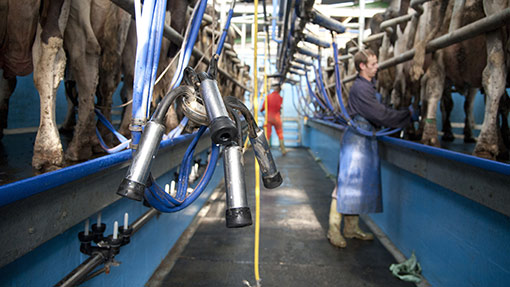Dairy industry code must be more widely embraced, says review

The dairy code that sets fair terms for farmers’ milk contracts must be understood and embraced more widely, according to a long-awaited review.
The NFU, NFU Scotland and trade association dairy UK should do more to explain how the dairy industry’s voluntary code works and explore if it could cover supermarkets, the report said.
Sir Alex Fergusson MSP, the independent review chair, has been gathering evidence since the start of the year about the code, set up after the 2012 milk crisis.
The review outlines only minor tweaks, including the addition of a “good practice clause” in milk contracts and clarification over notice periods for a price change and exclusivity to a supplier.
Mr Fergusson said he was surprised by the lack of interest in the review by individual farmers and representative groups.
“Where the voluntary code has been embraced it has been a positive tool, but a major weakness remains in that it is not embraced by more producers, producers’ representatives and purchasers,” Mr Fergusson said.
“The potential benefits that can be gained by embracing the code are not fully appreciated throughout the sector.”
One of the review’s main talking points was whether the same rules should apply to co-ops such as Arla and private companies such as Muller Wiseman.
Farmer-owned businesses have allowed farmers to leave contracts only with 12 months’ notice, compared to the three months set out in the voluntary code.
Mr Fergusson’s report concluded that co-ops did not have to change as long as notice periods were negotiated by “properly constituted democratically accountable supply groups”.
The recommendations in the review were:
- 30 days’ notice of a price change should only be required in the case of a price decrease
- A “good practice clause” should be added that says producers should be made fully aware of the details of their contract
- Payment of liquidated damages when a contract is terminated should be set out in the contract if it is allowed
- If a farmer wants to up production, the current processor should have the first chance to buy that milk, as long as it is under the same terms and conditions.
Dairy UK chief executive Dr Judith Bryans said the association welcomed the suggestions on a good practice clause, liquidation damages and exclusivity.
But she said there was not consensus among her members about the amount of notice needed before walking away from a contract.
“The reality is that differing levels of notice periods have created a security of supply issue for some of our members and risk creating a division within the industry,” she said.
“Long term, disparity around security of supply will not be helpful in attracting investment in the industry.”
